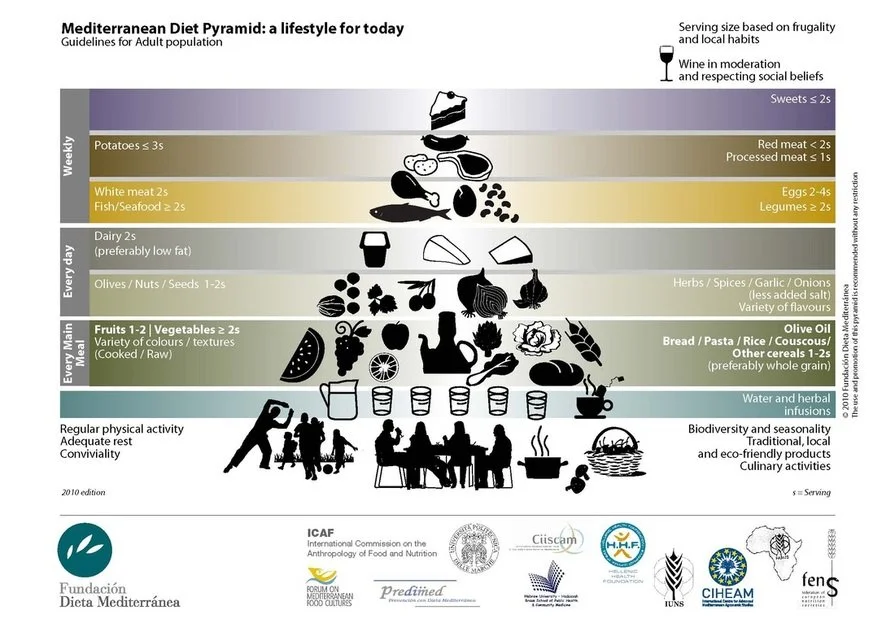the mediterranean diet
“The Mediterranean Diet has become a scientific myth based on the diet of the olive-growing countries of the 1960s, countries located in the Mediterranean Sea.”
“With the globalisation, countries suffered from what it’s called the nutrition transition towards a more Western diet (rich in fat, salt and sugar).”
WHAT IS IT?
The Mediterranean Diet has become a scientific myth based on the diet of the olive-growing countries of the 1960s, countries located in the Mediterranean Sea. This diet is mainly characterised by the consumption of olive oil and vegetable products(1). However, it involves not only the diet itself, but a culture that revolves around cooking and their gastronomy. Over decades and generations, they have developed an interest in the cultivation of vegetable products and a tradition of cooking together and sharing food with the family. And like this, the Sunday family meals were stablished where the family would come together to share a delicious meal and talk for hours.
Thus, the traditional diet includes a large variety and consumption of plant-based origin (olive oil, fruits, vegetables, legumes, nuts) and a low consumption of animal products (dairy products, meat, fish). Above all, the Mediterranean Diet stands out as a diet rich in unsaturated fats from extra virgin olive oil and nuts with strong nutritional properties. Thus, it seems that most of the benefits of the Mediterranean Diet are due to the high consumption of plant-based products rich in antioxidants, fibre and slow-digesting carbohydrates(1).
Source: http://www.predimed.es/pyramids.html
Don’t take into account the alcohol recommendation.
WHAT IS THE CURRENT DIET OF THE MEDITERRANEAN COUNTRIES?
With the globalisation, countries suffered from what it’s called the nutrition transition towards a more Western diet (rich in fat, salt and sugar). Similarly, the diet of Mediterranean countries has been shifting towards refined flours and cereals (with less fibre and fewer nutrients), consumption of red and processed meats and prepared products high in salt, sugar and saturated fats. This change has been more evident in younger generations than in adults(2-4). However, in Mediterranean countries, this transition has not been as rapid as in other countries in my opinion because of their strong gastronomic culture.
WHAT ARE THE BENEFITS OF THE MEDITERRANEAN DIET?
The Mediterranean Diet became famous among researchers thanks to a study that identified that Mediterranean countries stood out for their healthy ageing populations that lived longer (5). Subsequently, it was discovered that this diet has a particularly positive impact on mortality from cardiovascular diseases ("heart disease", stroke, etc.) and on the prevalence of diseases such as Parkinson's disease, Alzheimer's disease and various types of cancer. The PREDIMED study has become one of the most important studies in Spain on the impact of the Mediterranean Diet on various risk factors and as a strategy for the prevention of chronic diseases (see the website http://www.predimed.es / or https://www.predimedplus.com/ for more specific studies).
REFERENCES
1. Trichopoulou A, Martínez-González MA, Tong TYN, Forouhi NG, Khandelwal S, Prabhakaran D, et al. Definitions and potential health benefits of the Mediterranean diet: Views from experts around the world. BMC Med [Internet]. 2014 Jul 24 [cited 2022 Nov 28];12(1):1–16. Available from: https://bmcmedicine.biomedcentral.com/articles/10.1186/1741-7015-12-112
2. Zani C, Ceretti E, Grioni S, Viola GCV, Donato F, Feretti D, et al. Are 6-8 year old Italian children moving away from the Mediterranean diet? Ann Ig [Internet]. 2016 [cited 2022 Nov 28];28(5):339–48. Available from: https://pubmed.ncbi.nlm.nih.gov/27627665/
3. Tur JA, Romaguera D, Pons A. Food consumption patterns in a mediterranean region: does the mediterranean diet still exist? Ann Nutr Metab [Internet]. 2004 [cited 2022 Nov 28];48(3):193–201. Available from: https://pubmed.ncbi.nlm.nih.gov/15256802/
4. Serra-Majem L, Ribas L, Ngo J, Ortega RM, García A, Pérez-Rodrigo C, et al. Food, youth and the Mediterranean diet in Spain. Development of KIDMED, Mediterranean Diet Quality Index in children and adolescents. Public Health Nutr [Internet]. 2004 Oct [cited 2022 Nov 28];7(7):931–5. Available from: https://pubmed.ncbi.nlm.nih.gov/15482620/
5. Keys A, Mienotti A, Karvonen MJ, Aravanis C, Blackburn H, Buzina R, et al. THE DIET AND 15-YEAR DEATH RATE IN THE SEVEN COUNTRIES STUDY. Am J Epidemiol [Internet]. 1986 Dec 1 [cited 2022 Nov 28];124(6):903–15. Available from: https://academic.oup.com/aje/article/124/6/903/174332
